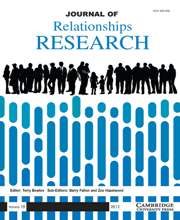Article contents
A Dyadic Analysis of Power and Friendship Functioning
Published online by Cambridge University Press: 15 April 2015
Abstract
This study explored how perceptions of resource control levels are related to perceptions of friendship functioning in late adolescent friendship dyads (92 female dyads, 43 male dyads; mean age = 19.59 years). Resource control, relationship influence, and positive and negative friendship features were determined using self- and friend-reports. Contrary to expectations, a latent actor-partner interdependence model (Olsen & Kenny, 2006) revealed uniformly positive effects of perceived resource control on friendship functioning. Perceived resource control was positively associated with positive friendship features and unrelated to negative friendship features for both friends. Results highlight the importance of studying friendship within the context of power and considering relationships and power as complementary rather than opposing elements of the social system.
Information
- Type
- Research Article
- Information
- Copyright
- Copyright © The Author(s) 2015
References
- 4
- Cited by

